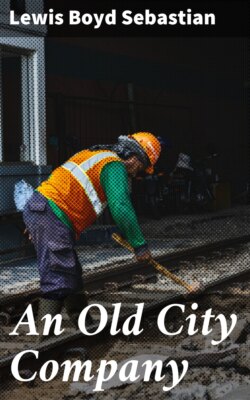Читать книгу An Old City Company - Lewis Boyd Sebastian - Страница 3
На сайте Литреса книга снята с продажи.
Introductory Note.
ОглавлениеTable of Contents
THIS historical sketch of the Skinners’ Company of London, to which I was apprenticed some forty years ago, and which I have since had the exceptional honour of serving through seven Wardenships and two Masterships (1886–7 and 1894–5) is an expansion of a Paper read before Ye Sette of Odd Volumes at Limmer’s Hotel, on the 25th November, 1902.
Who that reads can feel surprise that such a Company, with such a past—and such a present—commands and receives the loyal and enthusiastic devotion of all its members.
Five-and-twenty years ago disparaging criticisms of the ancient Livery Companies of the City of London were not uncommon. It had become a habit with writers of a certain class to describe the members of the Companies as illiterate people battening on public money, employing themselves in what was often spoken of as “gorging and guzzling” at the expense of their trusts, incapable of sitting down to a meal without the incentive of £5 notes secreted under their plates; and whose business, when any was done, largely consisted in granting beneficial leases of their trust estates to one another. All ignorant and malignant fiction.
Whether anyone ever believed these stories it is difficult to say. At the present time, at all events, there can be few, if any, who can continue to do so. In point of fact, the members of the Companies are very much like other people, educated in the same ways, and actuated by the same motives, but with a strong sense of their responsibility for the maintenance by their Companies of the high position which they gained, centuries gone by. The funds of which the Companies dispose are either their trust funds—as to the dealings with which the Charity Commissioners can speak—or their corporate funds, which are governed by their own pleasure. No £5 notes are hidden under plates; no beneficial leases of a Company’s property are granted to its members. The employment of a member of the Court of the Skinners’ Company to work for the Company for remuneration, whether professionally, commercially, or otherwise, is strictly prohibited. It is no doubt true that portions of the Companies’ own incomes are spent on entertainments, in accordance with the practice which has prevailed ever since the Companies existed at all; but I do not think that here, at all events, or in any other place where good fellowship prevails, any complaint will be made of this. Moreover, as the money spent is the Companies’ own, criticism would appear to be irrelevant. The entire income of the Companies, after payment of their expenses, including the cost of the entertainments, &c., is allocated to objects of public utility, selected by the owners.
The former misconceived attacks were very wounding to the members of the Companies, whose feelings of personal honour and of affection towards their Company were sorely outraged by them. For my own part, when I compare my Company, my School, my University, my College, my Inn of Court, I doubt whether any but William of Wykeham’s Winchester can vie with the Skinners’ Company in my affections.
There are several reasons for this which appear to me to be good. One is, that a member of such a Company feels himself to be connected by a direct link with the History of England, of which these Companies are part. Their destinies have been shaped and guided by men, of whom many have done good service to their country, and who stand towards their successors of later date in the position of honoured and revered ancestors, to be followed and imitated so far as change of circumstances permits. They are gone, but their work remains to be preserved and extended.
Another reason is the opportunity which membership of a Company affords of being of some little use in one’s own day and generation. There is great scope for this in the wise and prudent management of the affairs of a great Company. The sick have to be tended, the poor to be relieved, the schools to be governed, the exhibitions and prizes to be awarded, the estates to be managed, worthy institutions to be selected for support, all the multifarious matters connected with the ownership of property and the dispensation of charity to be controlled. All these must be of interest to any generous mind.
Then there is the association with agreeable and congenial comrades. Both Oxford and Cambridge are well represented in the Court of the Skinners’ Company, and few of the greater public schools lack at least one supporter. Eton, Winchester, Westminster, Harrow, Rugby, Charterhouse, Marlborough, Clifton, Tonbridge, King’s College School, are all to be found there. Other members have been claimed by Commerce at an early age, but all are cultivated and kindhearted, and united in the desire to promote the benefit of the Company and the useful and just disposal of its resources. A pleasanter or more congenial society could not easily be found. It has been a source of much gratification to me that I was allowed to assume the title of “Skynner” to ye Sette.
The narrative which follows can be filled in by reference to the “Account of the Worshipful Company of Skinners of London,” which was published by my regretted friend and colleague, the late James Foster Wadmore, A.R.I.B.A., while this Paper was in course of preparation. He had then recently completed fifty years of service in the Court of the Company, of which he was for several years the senior member, but survived the publication only a few months.
